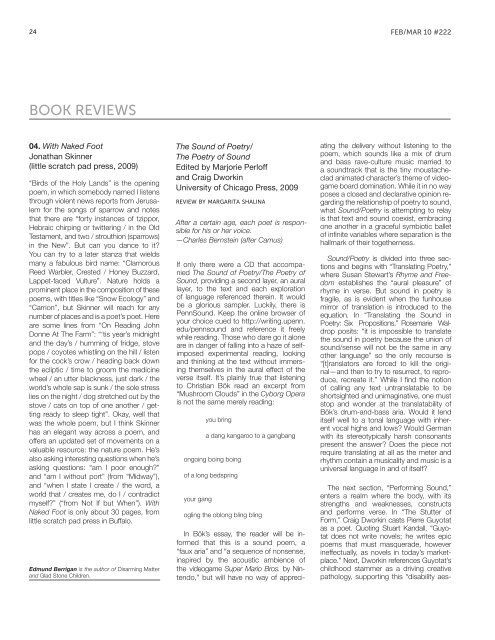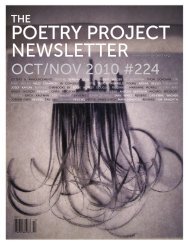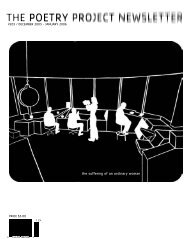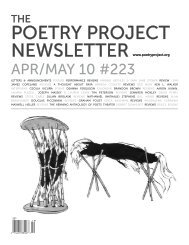Create successful ePaper yourself
Turn your PDF publications into a flip-book with our unique Google optimized e-Paper software.
24 FEB/MAR 10 #222<br />
BOOK REVIEWS<br />
04. With Naked Foot<br />
Jonathan Skinner<br />
(little scratch pad press, 2009)<br />
“Birds of the Holy Lands” is the opening<br />
poem, in which somebody named I listens<br />
through violent news reports from Jerusalem<br />
for the songs of sparrow and notes<br />
that there are “forty instances of tzippor,<br />
Hebraic chirping or twittering / in the Old<br />
Testament, and two / strouthion (sparrows)<br />
in the New”. But can you dance to it?<br />
You can try to a later stanza that wields<br />
many a fabulous bird name: “Clamorous<br />
Reed Warbler, Crested / Honey Buzzard,<br />
Lappet-faced Vulture”. Nature holds a<br />
prominent place in the composition of these<br />
poems, with titles like “Snow Ecology” and<br />
“Carrion”, but Skinner will reach for any<br />
number of places and is a poet’s poet. Here<br />
are some lines from “On Reading John<br />
Donne At <strong>The</strong> Farm”: “‘tis year’s midnight<br />
and the day’s / humming of fridge, stove<br />
pops / coyotes whistling on the hill / listen<br />
for the cock’s crow / heading back down<br />
the ecliptic / time to groom the medicine<br />
wheel / an utter blackness, just dark / the<br />
world’s whole sap is sunk / the sole stress<br />
lies on the night / dog stretched out by the<br />
stove / cats on top of one another / getting<br />
ready to sleep tight”. Okay, well that<br />
was the whole poem, but I think Skinner<br />
has an elegant way across a poem, and<br />
offers an updated set of movements on a<br />
valuable resource: the nature poem. He’s<br />
also asking interesting questions when he’s<br />
asking questions: “am I poor enough?”<br />
and “am I without port” (from “Midway”),<br />
and “when I state I create / the word, a<br />
world that / creates me, do I / contradict<br />
myself?” (“from Not If but When”). With<br />
Naked Foot is only about 30 pages, from<br />
little scratch pad press in Buffalo.<br />
Edmund Berrigan is the author of Disarming Matter<br />
and Glad Stone Children.<br />
<strong>The</strong> Sound of <strong>Poetry</strong>/<br />
<strong>The</strong> <strong>Poetry</strong> of Sound<br />
Edited by Marjorie Perloff<br />
and Craig Dworkin<br />
University of Chicago Press, 2009<br />
review by margarita shalina<br />
After a certain age, each poet is responsible<br />
for his or her voice.<br />
—Charles Bernstein (after Camus)<br />
If only there were a CD that accompanied<br />
<strong>The</strong> Sound of <strong>Poetry</strong>/<strong>The</strong> <strong>Poetry</strong> of<br />
Sound, providing a second layer, an aural<br />
layer, to the text and each exploration<br />
of language referenced therein. It would<br />
be a glorious sampler. Luckily, there is<br />
PennSound. Keep the online browser of<br />
your choice cued to http://writing.upenn.<br />
edu/pennsound and reference it freely<br />
while reading. Those who dare go it alone<br />
are in danger of falling into a haze of selfimposed<br />
experimental reading, looking<br />
and thinking at the text without immersing<br />
themselves in the aural effect of the<br />
verse itself. It’s plainly true that listening<br />
to Christian Bök read an excerpt from<br />
“Mushroom Clouds” in the Cyborg Opera<br />
is not the same merely reading:<br />
you bring<br />
a dang kangaroo to a gangbang<br />
ongoing boing boing<br />
of a long bedspring<br />
your gang<br />
ogling the oblong bling bling<br />
In Bök’s essay, the reader will be informed<br />
that this is a sound poem, a<br />
“faux aria” and “a sequence of nonsense,<br />
inspired by the acoustic ambience of<br />
the videogame Super Mario Bros. by Nintendo,”<br />
but will have no way of appreci-<br />
ating the delivery without listening to the<br />
poem, which sounds like a mix of drum<br />
and bass rave-culture music married to<br />
a soundtrack that is the tiny moustacheclad<br />
animated character’s theme of videogame<br />
board domination. While it in no way<br />
poses a closed and declarative opinion regarding<br />
the relationship of poetry to sound,<br />
what Sound/<strong>Poetry</strong> is attempting to relay<br />
is that text and sound coexist, embracing<br />
one another in a graceful symbiotic ballet<br />
of infinite variables where separation is the<br />
hallmark of their togetherness.<br />
Sound/<strong>Poetry</strong> is divided into three sections<br />
and begins with “Translating <strong>Poetry</strong>,”<br />
where Susan Stewart’s Rhyme and Freedom<br />
establishes the “aural pleasure” of<br />
rhyme in verse. But sound in poetry is<br />
fragile, as is evident when the funhouse<br />
mirror of translation is introduced to the<br />
equation. In “Translating the Sound in<br />
<strong>Poetry</strong>: Six Propositions,” Rosemarie Waldrop<br />
posits: “it is impossible to translate<br />
the sound in poetry because the union of<br />
sound/sense will not be the same in any<br />
other language” so the only recourse is<br />
“[t]ranslators are forced to kill the original—and<br />
then to try to resurrect, to reproduce,<br />
recreate it.” While I find the notion<br />
of calling any text untranslatable to be<br />
shortsighted and unimaginative, one must<br />
stop and wonder at the translatability of<br />
Bök’s drum-and-bass aria. Would it lend<br />
itself well to a tonal language with inherent<br />
vocal highs and lows? Would German<br />
with its stereotypically harsh consonants<br />
present the answer? Does the piece not<br />
require translating at all as the meter and<br />
rhythm contain a musicality and music is a<br />
universal language in and of itself?<br />
<strong>The</strong> next section, “Performing Sound,”<br />
enters a realm where the body, with its<br />
strengths and weaknesses, constructs<br />
and performs verse. In “<strong>The</strong> Stutter of<br />
Form,” Craig Dworkin casts Pierre Guyotat<br />
as a poet. Quoting Stuart Kandall, “Guyotat<br />
does not write novels; he writes epic<br />
poems that must masquerade, however<br />
ineffectually, as novels in today’s marketplace.”<br />
Next, Dworkin references Guyotat’s<br />
childhood stammer as a driving creative<br />
pathology, supporting this “disability aes-

















